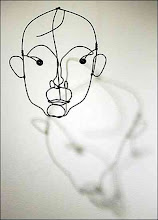NPR ran this piece yesterday about some research on bats and how they distinguish communicative noises made by their colleagues from the background noise of their echolocation blasts. The piece mentions that this research will be useful in helping to figure out how human brains focus in on certain particularly useful noises and ignore presumably unimportant noises from the background (such as focusing on a conversation at a loud cocktail party). Turns out that in the bats, at least, it's as if many different neurons are constantly reporting "Here's what I hear. Here's what I hear...", and certain neurons are good at telling the neurons around them to stop listening and reporting so much on the background noise so they can hear the communicative audio. And those neurons that are quieting down the others become particularly noticeable in their own reporting, because all else is quieter around them.
This also happens to be a good description of a range of theories on how the brain is able to make ongoing, constant decisions about what to pay attention to and what to tell the rest of the body to actually do (both "voluntary" and "involuntary" actions). As I've mentioned in previous posts, the theory goes something like this--neurons or groups of neurons in the brain are constantly arguing with each other, trying to make their case about what is important or not important. When one set of neurons wins that argument (when they are successful at getting more attention than other neurons), then a decision has been made to direct attention and energy in that direction.
So, at least in terms of how some portion of our brains work, we may not be that different from bats. Or maybe even bat terriers.
Wednesday, November 24, 2010
Friday, November 5, 2010
The Picture Gradually Comes into Focus
More and more research confirms memory distribution in the brain, providing answers to many questions such as why it is that local brain injury doesn't cause more global memory loss, the way other functions are frequently affected by local injuries.
Subscribe to:
Comments (Atom)



